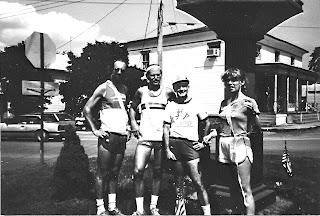When I try to describe this blog, I tell people first that it’s not self-help—I don’t want them to think that I can actually help them, like send them to some agency and their troubles will be assuaged.
But here’s some self-help I can’t resist sharing.
Late last spring I realized that I would be much more patient with the sniffing of Lulu, my basenji, on our walks if I read while she sniffed. For years I had spent her sniffing in an effort to be aware of my surroundings, but we take two or three walks a day, including a mile-long walk, and I needed something new.
Footnote: Lulu and I do take walks in the woods—we’re regulars on the Columbia Land Conservancy circuit—and special walks, in the cemetery, for instance, so I can read the gravestones while she sniffs. Upon our arrival in Hudson we tried to explore the city on foot, but we discovered that each block is home to at least one Enemy Dog defending its turf in a way that made me nervous. Lulu has a Napoleon complex, and it’s up to me to keep her safe.
I would love to walk down Warren Street looking in the shop windows and talking to people while Lulu sniffed, but Warren Street, with its noise and its people to talk to, makes Lulu nervous. Most days, then, we take our long walk on Union Street, with its occasional lawns, lots of hedges, and piles of leaves that may hide dead things.
On Union Street one afternoon for the one-thousandth time, I was trying to make myself aware of the light and the sounds of the day and the season, while really what I wanted was to speed walk down to the river, but I left my job to take care of this dog, so some compromise was needed here, not texting or talking on my cell phone, but a compromise that worked for me.
A book.
I needed a book, a small book with a strong story line that I could read a paragraph at a time. I’m not talking about reading while actually walking, that’s too silly, but my reading during her sniffing. And no, I don’t need an iPod. This past Thanksgiving, as Lulu and I walked, the silence of Union Street suggested rest, a city momentarily at peace. On this mild day windows were open and I heard a child’s voice, and later, snatches of Spanish, and on the way home, a speakerphone conversation in the lilt of the islands. I know you wouldn’t want me to give that up.
Enter Stephen King. When I retired last fall D. kindly gave me How Fiction Works by James Wood and On Writing by Stephen King. Wood doesn’t allow for keeping half an eye on the dog, who has inserted her snout up to her eyes into some vegetative matter, but I figured King would write a narrative, whatever his subject. His book was a thick mass-market paperback, promising hours of happy dog walks.
Now when I think back to last summer, with the searing heat that led Lulu and me to walk our mile early in the morning, I flash back to the street in a waking city. The Meyers Contracting crew is assembling as Lulu sniffs and I read the generous, wise, witty advice of Stephen King. I read the book from the first page to the last, no skipping around. I didn’t think I would care about his early life, but I did. His few examples from his own books still underwhelmed me, but the guy does know how to inspire. I wish I had read his book-writing process years ago; I’ve been doing it all wrong. But it’s not too late to change.
Then summer was waning and I had finished On Writing. I had to move on. Wolf Whistle worked—a wild novel by Lewis Nordan centered around the death of Emmett Till. I had meant to read it for years—had packed and unpacked it twice as I moved. Now Lulu gave me the time. Lately, I keep up on my issues of One Story, a literary magazine that sends out one short story at a time. Good stories, well told, and at 5 x 7 inches, the perfect size for dog walking.
That’s it—that’s my advice for today. Enrich your life while walking your dog!
*Verse: Rupert Brooke.
Image: Nancie Dunn, nanciedunncards.com
Image: Nancie Dunn, nanciedunncards.com























